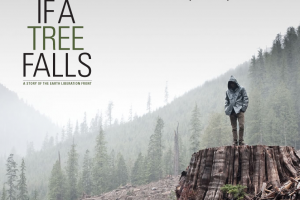This Wednesday, a documentary named “If A Tree Falls” by Marshall Curry was showed at Cornell cinema. This film is both interesting and thought provoking, providing us with a different perspective to look into those crimes. It is debatable when it comes to giving a definition to those environmental fanatics. Terrorists or heroes? It is not proper to just simply make a judgement by looking only at one dimension of their action. To get a comprehensive understanding of this issue, we may consider evaluating their motivation, approach and consequences caused.
Undoubtedly, Daniel and his friends have a right motivation that they care for the environment and have great enthusiasm of protecting our ecological system. A detail was mentioned about Daniel that he would recycle every single piece of paper in his daily life. Actually, I think we need more people just like Daniel in our society, who has formed strong awareness of caring for our environment.
However, the way they approach their goal is radical and extreme. The consequences caused are serious individual property damage and loss. But try to think that if you consider it in a whole picture, after burning down one timber factory, there are still thousands of timber factories standing and as long as the timber is demanded for use, more factories will be reestablished to meet the demand. The root of this problem is a contradiction between the increasing demand of human beings and the need for protecting the environment. The government should be responsible for the role of balancing these two aspects and improving the law system as well as the market management. It could be possible for the government to set up additional tax and set a high price for logging using market mechanism to make it relatively expensive to cut down trees. Thus, policies can be used to lead the behavior of consumers as well as timber factories incorporating the externalities of environmental damage caused by logging.
In contrast, the arising of radical behaviors like damage caused by ELF is also a reflection of the deficiency of current policies and bad behaviors of authorities. They did the damage because there is nothing else they can do to make a real change. We can see the protestors walking among the street but were treated with violence from local police. We can also see people who were trying to prevent the tree from being cut down were driven away and even arrested by the police. These scenes were not supposed to happen in a country that respects the rule of law. Maybe there should be a seminar led by local committee discussing the issue whether the tree should be removed with democracy considering all the aspects of interest. Unfortunately, they cannot find a way out. From this perspective, their actions seem understandable.
Finally, in my opinion, this case should not be a case used to arguing and studying how to deal with, definite and sentence those crimes. Instead, it seems more like an alert that the conflict and imbalance of human and environmental resources is sharply rising and gives us a push to improve our current system and seek for more effective policies to solve to problem.


